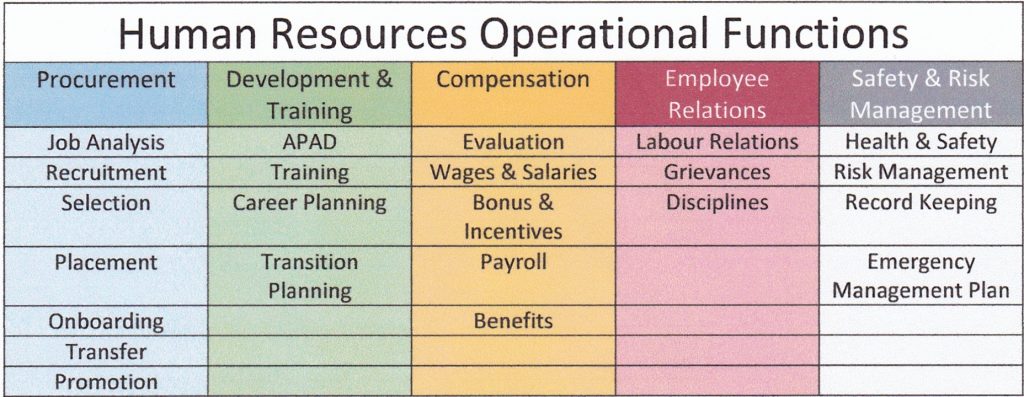The Human Resources department handles a range of different functions within an organization as outlined on the chart above. The department works diligently behind the scene to ensure an organization runs efficiently. Basically, “keeping everyone out of trouble”. HR involves developing and administering programs that are designed to increase the effectiveness of an organization.
Procurement of Recruiting and Hiring
HR oversees and ensures that the process of recruiting and hiring meets or exceeds and is compliant of all laws, policies, procedures, and legislation. This includes writing job descriptions, job advertisements, screening resumes, scheduling interviews, performing interviews, checking references, credentials etc. of potential employees; ensuring all paperwork re: employment is completed in full and error free. Ensuring the orientation process is in place and adhered too. Identifies that need, creates and updates policies and procedures. HR assists in the succession planning to ensure that the proper roles are available for the proper employees funded by a sufficient budget.
Development and Training and Career Development
HR ensures that all employees hold current certification if deemed necessary, schedules needed training, maintains training records. HR works in conjunction with department supervisors to determine training needs for the organization or individual employees. Also, responsible for the contracts with training providers and monitoring training budgets.
Compensation
HR is responsible for various aspects of employee compensation. It handles employee payroll, ensures employees are paid accurately and on time with the correct deduction made. Ensures that the organization is compliant with all necessary elements of the payroll such as payroll deduction remittances, T4 and T4A generation, ROE’s, SUB plan application, payments, and calculations. HR also manages other compensation programs that would include pensions, health plans, dental plan, life insurance / LTD and dependent life plans. Maintains benefits records to ensure usage of paid time off such as sick time, vacation time, job-protected leaves, also unpaid time off and how it affects the eligibility of benefits.
Employee Relations
HR handles the relationship between employees and management and/or unions. They handle the communication between these different groups also any disputes that may arise. HR ensures that any discipline that is required is well documented, compliant to all legislation, policies, procedures, human rights, and labour standard levels. HR is responsible for interpreting and enforcing employment and labour laws such as equal employment opportunity, fair labour standards, benefits and wages, and work hour requirements.
Occupational Health and Safety and Risk Management
HR ensures that the organization meets or exceeds all requirements for the health and safety of the organization. Ensures that JOHS committees or representatives are created, trained and fully active within the organization. They are usually the primary contact for work-site injuries or accidents and work closely with the Worker’s Compensation Board.
QUESTIONS
Q – Does HR have a job description?
A – HR is one portion of our job so it does not have a standalone job description. It has always been one of our responsibilities in our current job descriptions.
Q – What do other HR departments look like in other organizations?
A – Most small business do not have an HR department. Large organizations divide the duties into different departments. Payroll is a standalone, health and safety is a standalone, labour relations are a standalone, usually one person is responsible for dealing with employee issues.
Q – Is there guidelines to who is a part of the HR team and how many?
A – HR is a function of the Finance team. HR designations are required to be part of the HR team. Both members of the HR team have these designations. In order to part of the team you need a 4-year university Business degree. We have designations with the Canadian Payroll Association. We have a 2-year diploma in Human Resources Management from a college. We have a 2-year certificate in Occupational Health and Safety from a university. After completing the 2-year diploma, we spent a weekend preparing to write the National Knowledge Exam (NKE) for the Chartered Professional in Human Resources designation. We successfully challenged the 4 hour NKE. At which time, we had to prove and document at least 3 years of human resources experience. This document was vetted through a panel and scored. Upon successful completion of this document we were awarded the Chartered Professional in Human Resources designation. In order to maintain this designation, annual fees must be paid in the range of $500 plus complete at least 30 hours of professional development credits annually. These credits must be verifiable and reported annually to be vetted through the council for approval.
Q – How do you divide the duties between you and Elisha? Specifically, if I have a question relating to HR, who would I direct it to?
A – You can ask either Carrie or Elisha the question. The answer may come from another source depending on the requirement.
Q – Do you cover HR concerns for the participants or is it mostly staff?
A – Human Resources is in place to handle the needs and requirements of employees. Participants are not employees.

